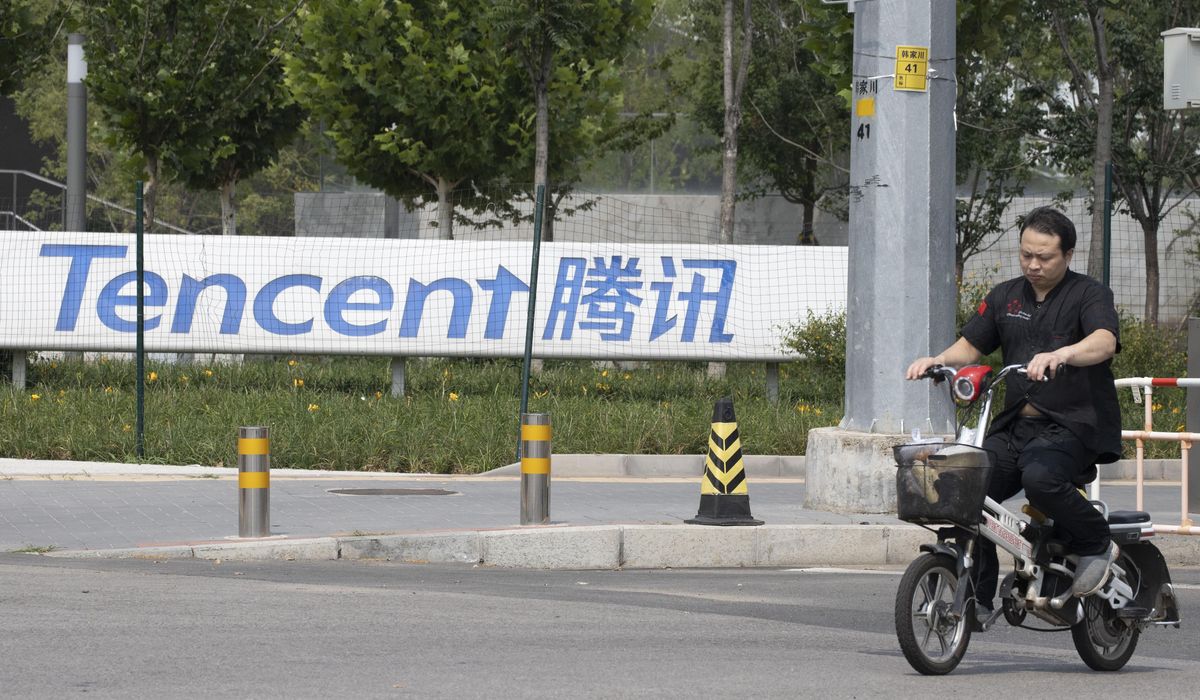


The Pentagon added social media giant Tencent Holdings and battery maker CATL to its list of some 134 sanctioned Chinese commercial entities identified as having links to the country’s military.
The designations known as the “1260H list,” after the section of a 2021 defense law, also included leading electric vehicle battery maker CATL among the companies identified as working with the People’s Liberation Army and operating in the United States.
Tencent is the parent company of the popular instant messaging, social media and mobile payment app WeChat, which is available in the United States.
Both companies called the listing, which prohibits those named from serving as a supplier for the Defense Department, a mistake.
A third new addition to the Pentagon list is the China COSCO Shipping Corp., the country’s largest shipping company.
The COSCO roll-on/roll-off freighter Bang Chui Dao was used in a 2019 PLA exercise. The Pentagon believes the freighters would be part of plans for ferrying troops and tanks across the Taiwan Strait during a future invasion of the island.
“Updating the Section 1260H list of ’Chinese military companies’ is an important continuing effort in highlighting and countering the People’s Republic of China’s military-civil fusion strategy,” the Pentagon said Tuesday in a statement announcing the updated list.
The strategy is used by the PLA for its modernization “by ensuring it can acquire advanced technologies and expertise developed by PRC companies, universities, and research programs that appear to be civilian entities,” the Pentagon statement said.
The law directs the Pentagon to identify companies that are part of the military-fusion program and that operate directly or indirectly in the U.S. market.
In Beijing, Foreign Ministry spokesman Guo Jiakun accused the Biden administration of “overstretching the concept of national security, making discriminatory lists in various names, and going after Chinese companies to contain China’s high-quality development.”
“We urge the U.S .to immediately correct its wrongdoings and end the illegal unilateral sanctions and long-arm jurisdiction on Chinese companies,” Mr. Guo said.
Shares of Tencent, CATL and COSCO declined sharply on the Hong Kong stock exchange after the list was published Monday in the Federal Register. Tencent told reporters the designation would not affect its business and that the company plans to seek ways to have the listing removed.
CATL, the world’s largest electric vehicle battery maker, denied it was involved in any military activities, Reuters reported.
Listing on the military companies list does not result in an immediate ban of company activities in the United States. But it can affect the companies’ reputations.
The list was required by Congress over concerns that U.S. money spent on the Chinese companies operating in the United State is bankrolling China’s military buildup that military officials have said is the largest of any country in the world since World War II. The list also could result in Treasury Department sanctions.
In addition to the three companies, the Pentagon also added the microchip maker Changxin Memory Technologies, and drone manufacturers Autel Robotics.
Other companies on the list include weapons makers, telecommunications companies, cyber security firms, construction firms, nuclear energy firms, oil companies and semiconductor manufacturers.
The federal government for the past decade has sought to prevent U.S. business from assisting the Chinese military buildup.
The most recent list removed six Chinese companies added in 2024 that the Pentagon determined no longer operate directly or indirectly in the United States.
“Today’s 1260H list lays bare that these aren’t just commercial companies — they’re critical enablers of China’s military modernization, directly fueling Beijing’s strategic ambitions,” said Craig Singleton, senior China fellow at the Foundation for Defense of Democracies.
“Doing business with or otherwise investing in any of these firms isn’t just risky; it’s reckless.”
The foundation also released a report on CATL showing that the company’s battery projects in 11 states.
In a related development, Treasury Secretary Janet Yellen met by video on Monday with Chinese Vice Premier He Lifeng, according to a statement from the Treasury Department. Ms. Yellen voiced U.S. concerns about Chinese non-market policies and industrial overcapacity that that Treasury officials contend harm U.S. workers and firms.
She also said the practices “will continue to adversely affect the U.S.-China bilateral economic relationship” unless addressed.
Ms. Yellen also told the Chinese leader about U.S. “serious concern about malicious cyber activity by PRC state-sponsored actors and its impact on the bilateral relationship.” The issue reflected large-scale Chinese hacking operations recently uncovered against U.S. telecommunications companies and other critical infrastructure.
• Bill Gertz can be reached at bgertz@washingtontimes.com.
